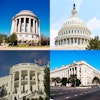Antitrust
The Chamber advocates for antitrust laws that benefit all consumers and businesses and do not target specific companies or industries.

Latest
Our Work
Antitrust laws ensure competition in free and open markets, which is the foundation of any vibrant, diverse, and dynamic economy. Healthy market competition benefits consumers through lower prices, higher quality products and services, more choices, and greater innovation.
Events
- EconomySmall Business Update: One Big Beautiful Bill, Taxes, and TariffsTuesday, July 1512:00 PM EDT - 12:30 PM EDTVirtualLearn More
- Employment PolicyApproaches to Combating Human TraffickingMonday, July 2108:30 AM EDT - 02:30 PM EDTVirtualLearn More
- Small BusinessC-Suite to Main Street: Building a Multi-Million Dollar Business from the Ground UpThursday, August 1412:00 PM EDT - 12:30 PM EDTVirtualLearn More
Latest Content
- Recent European Union (EU) merger developments raise concerns for both European and non-European businesses and consumers, and the ability of national governments to regulate events that affect their local economies.
- A new study finds that under the previous approach to merger enforcement there was a strong link between mergers and innovation. A radical new approach to merger enforcement poses a severe threat to the economy.
- This study evaluates the relationship between mergers and acquisitions and research and development expenditures.
- Chief Policy Officer Neil Bradley issued the following statement in response to the fourth meeting of the President’s Competition Council.
- U.S. Chamber statement in response to the release of a new National Telecommunications and Information Administration (NTIA) report on the mobile application store ecosystem.
- The Federal Trade Commission’s most-recent actions to ban non-compete agreements oversteps its statutory authority under the FTC Act. If they are allowed to write this rule, here’s what might come next.
- 100 business groups request a comment extension on the FTC's notice of proposed rulemaking potentially banning noncompete clauses in employment contracts.
- The FTC claims its proposed ban on non-competes would yield a $300 billion surplus to employees’ wages. But did the agency check its math? The Chamber’s Chief Economist Curtis Dubay takes a hard look at the numbers
- It's hard to reconcile Chair Lina Khan's words with the FTC's actions. Congress and the courts will have to provide a course correction.
- FTC response to a Chamber FOIA request on unpaid experts and consultants at the FTC.












